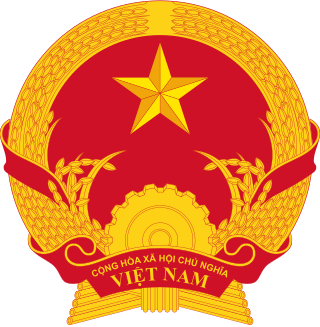
The Government of the Socialist Republic of Vietnam is the cabinet and the central executive body of the state administration of Vietnam. The members of the Government are appointed by the President of Vietnam on the advice of the Prime Minister of Vietnam and approved by the National Assembly. The Government is led by the Communist Party of Vietnam (CPV), which is headed by the CPV general secretary, often seen as the highest political post in Vietnam.

The president of the Socialist Republic of Vietnam is the head of state of Vietnam, elected by the National Assembly of Vietnam from its delegates. Since Vietnam is a one-party state, candidates for the post are nominated by the Central Committee of the Communist Party of Vietnam. The officeholder is generally considered to hold the second-highest position in the political system, practically after the general secretary of the Communist Party of Vietnam. As head of state, the President represents Vietnam both domestically and internationally, and maintains the regular and coordinated operation and stability of the national government and safeguards the independence and territorial integrity of the country.
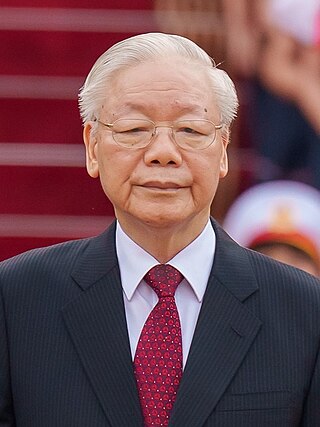
Nguyễn Phú Trọng was a Vietnamese politician and communist theorist who served as general secretary of the Communist Party of Vietnam from 2011 until his death in 2024. As the head of the party's Secretariat, Politburo and Central Military Commission, Trọng was considered Vietnam's paramount leader. From 2018 to 2021, he also served concurrently as the tenth president of Vietnam.
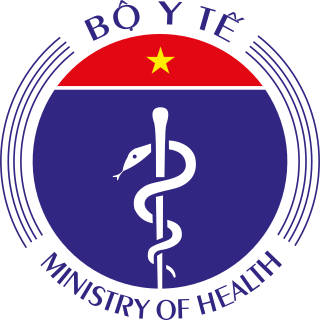
The Ministry of Health is the government ministry responsible for the governance and guidance of the health, healthcare and health industry of Vietnam. In conjunction with other ministries and the prime minister's office, the Ministry is responsible for creating and promulgating long-term health policy programs such as the "National Strategy on Nutrition for the 2001 - 2010 period" and the "National Policy on Injury Prevention 2002 - 2010". Its main offices are located in Ba Đình District, Hanoi.

Trương Tấn Sang is a Vietnamese politician, who served as the eighth President of Vietnam from 2011 to 2016. He was one of Vietnam's top leaders, alongside prime minister Nguyễn Tấn Dũng and Party general secretary Nguyễn Phú Trọng. In July 2011, Trương Tấn Sang was elected state president of the Socialist Republic of Vietnam by the National Assembly of Vietnam and nominated by his predecessor Nguyễn Minh Triết who retired from office.
The 4th Politburo of the Communist Party of Vietnam (CPV), formally the 4th Political Bureau of the Central Committee of the Communist Party of Vietnam (Vietnamese: Bộ Chính trị Ban Chấp hành trung ương Đảng Cộng sản Việt Nam Khoá IV), was elected at the 1st Plenary Session of the 4th Central Committee in the immediate aftermath of the 4th National Congress.
The 3rd Politburo of the Workers' Party of Vietnam (WPV), formally the 3rd Political Bureau of the Central Committee of the Workers' Party of Vietnam (Vietnamese: Bộ Chính trị Ban Chấp hành trung ương Đảng Lao động Việt Nam III), was elected at the 1st Plenary Session of the 3rd Central Committee in the immediate aftermath of the 3rd National Congress.
The 5th Politburo of the Communist Party of Vietnam (CPV), formally the 5th Political Bureau of the Central Committee of the Communist Party of Vietnam (Vietnamese: Bộ Chính trị Ban Chấp hành trung ương Đảng Cộng sản Việt Nam Khoá V), was elected at the 1st Plenary Session of the 5th Central Committee in the immediate aftermath of the 5th National Congress.

The 1st Central Committee of the Indochinese Communist Party was in session from 1935 to 1951.
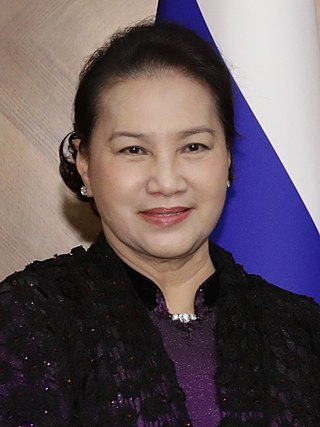
Nguyễn Thị Kim Ngân is a Vietnamese economist and politician. She is the first woman in Vietnamese history to head the country's legislature, serving as the eleventh Chair of the National Assembly of Vietnam from 2016 to 2021. She was a member of the 12th Politburo of the Communist Party, the country's highest decision-making body, in which she ranked second after General Secretary Nguyễn Phú Trọng.

On 27 January 2016, the 12th National Congress elected 180 individuals to serve as members of the 12th Central Committee of the Communist Party of Vietnam (CPV) for the electoral term 2016–2021. The Central Committee is the highest decision-making institution in the CPV and Vietnam when the Party's National Congress and the Politburo are adjourned. In between congresses, the Central Committee is responsible for organising and directing the implementation of the Party's Political Platform, Charter, and resolutions adopted at the National Congress. Furthermore, it adopts guidelines and policies in all relevant fields, domestic or foreign. In addition, the sitting Central Committee is responsible for convening the next National Congress. Members of the Central Committee have the right to elect and remove the General Secretary of the Central Committee as well as members of the Politburo, the Secretariat and the Central Inspection Commission (CIC). When the Central Committee is not in session, it delegates its powers to these three elected organs which then report on their activities the next time the Central Committee convenes for a meeting. Central Committee members are responsible to and report on their work to the Central Committee.

The 12th Politburo, formally the Political Bureau of the 12th Central Committee of the Communist Party of Vietnam, was elected at the 1st Plenary Session of the 12th Central Committee (CC) on 27 January 2016 during the 12th National Congress to serve for a five-year electoral term. Based on the principle that "the Party leads and the State manages", the Politburo is the highest decision-making institution in the CPV and Vietnam when the Party's National Congress and the Central Committee are adjourned. According to Party rules, the Politburo directs the general orientation of the government; it convenes meetings several times a month to discuss and decide policy, which is then implemented by the relevant state or party bodies, such as the National Assembly of Vietnam if the policy concerns law-making, or the Party's Central Organisation Commission if it concerns cadre policy. The total number of meetings the 12th Politburo convened has not been publicly disclosed to the media. Some have been publicly reported, however, and are listed below.
The following are events that happened during 2013 in Vietnam.

Tô Lâm is a Vietnamese politician and former police officer who has served as general secretary of the Communist Party of Vietnam (CPV) since August 2024 and the 13th president of Vietnam from May 2024 to October 2024. A career officer in the People's Public Security Forces for over 40 years, Lâm previously served as Minister of Public Security from 2016 until his election to the presidency in 2024.

Võ Văn Thưởng is a Vietnamese politician who served as the 12th president of Vietnam from March 2023 to March 2024, being the youngest person to serve in this position since the country's reunification at the age of 52. His resignation after just over one year in office amidst the Communist Party's anti-corruption campaign made him the second shortest-serving president in Vietnamese history, after Tô Lâm.
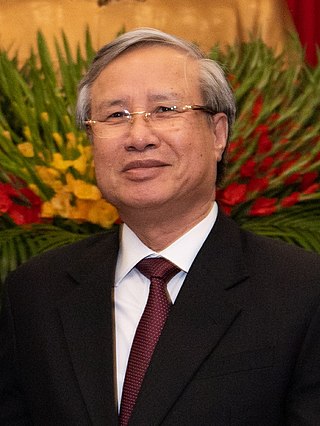
Trần Quốc Vượng is a Vietnamese politician. He was a member of the Politburo of the Communist Party of Vietnam, Permanent Member of the Party Central Committee's Secretariat, Former Deputy Head of Central Steering Committee on Anti-corruption, Member of the National Assembly of Vietnam. He has worked in many units and agencies of the Communist Party of Vietnam and Socialist Republic of Vietnam, serving as Chairman of the Central Inspection Commission of the Communist Party of Vietnam; Head of Central Office of the Communist Party of Vietnam, Secretary of the Party Personnel Committee, Prosecutor General of the Supreme People's Procuracy of Vietnam.

Trương Thị Mai is a Vietnamese politician. She was the Permanent Member of the Secretariat and Head of the Central Organization Commission of the Communist Party of Vietnam, being the first woman to hold these positions.
Dao Minh Quan is a Vietnamese-American politician. He is the 3rd President of the Third Republic of Vietnam, a claimed government in exile. He is known for starting the Vietnam New Democratic Movement.

The 4th Central Committee of the Communist Party of Vietnam (CPV) was elected at the 4th CPV National Congress. It elected the 4th Politburo and the 4th Secretariat.

The 2nd Central Committee of the Workers' Party of Vietnam (WPV) was elected at the 2nd WPV National Congress. It elected the 2nd Politburo and the 2nd Secretariat.














